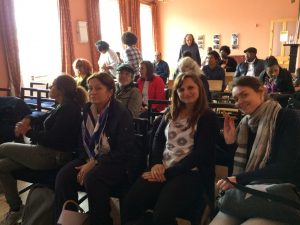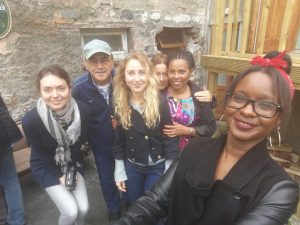The purpose of the visit of Barka Ireland Team (Mirek Zaczynski and Aleksandra Kubiak) was to learn about homeless services in Iceland and to see the work of Barka with vulnerable Eastern European migrants in Reykjavik.
Reykjavik really tells me what a small city is supposed to be in the 21st century. Apart from the small amount of public transport and the sprawl, I really think this is a good-looking role model for a small city when it comes to infrastructure. The buildings are all contemporary, even somewhat futuristic.
We went to one of the homelessness shelters. In city of Reykjavík there are three temporary shelters. Although the most popular “shelter” for the homeless people in Iceland is the police station. Most can just show up there and obtain a place to sleep for the night, although on some nights committing a small crime is necessary if one wants to get a bed. There are no homeless day centers as such which, in some countries, can also provide job training and placement as well as substance abuse counselling. We had an opportunity to meet with one of the managers of the shelter. During that meeting we found out that between 30 and 50 percent of those who take advantage of the shelter are foreigners, most of them Polish, with a legal residence in Reykjavík. Most of the times these are men who came here for work. Following the economic crash, they lost their jobs and homes and battled alcoholism. They have no place to stay and it’s hard for them to seek treatment, since no treatment is offered by Polish-speaking people and these men typically do not have strong English skills.
This meeting for me personally was very interesting because we not only found out interesting information about rights of homeless people in Iceland but I could also see that the person who manages that place was able to openly talk about his own addiction and that he has been sober for 20 years, I could see that working with the homeless people was very close to his heart.
Afternoon we spent in Kaffistofan cafeteria which serves free hot meals and snacks between 10:00 and 17:00. Everyone is welcome, and the cafeteria is visited by anyone looking for a free meal, a place to sit and read a paper or a place to meet with friends. We met a Polish group of homeless people who have lived in Iceland between 4 to 13 years. We spent there a few hours and chatted with our new Polish friends. Their story is quite similar to the stories of homeless people we’re working with in Dublin. Of course homelessness and rough sleeping are far more complex than simply finding yourself on the streets one day; any number of issues – mental health, drugs and alcohol, crime – play their part.
One person said that in Iceland it’s easier to be homeless that in other country. He travel to different parts of Europe. He know that “here is good place to be homeless”. In Iceland after 6 months of work person in able to receive social welfare and other benefits (rent support, illness benefit including social welfare payment). Our friends were very friendly and openly talk about their life in Iceland. Most of them said that one day soon they will stop drinking and will look for job, and say that if people want to work, it is no problem, they can find a job next day.
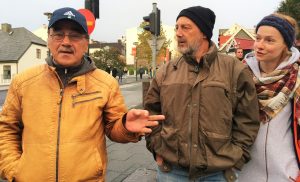 The day after we went to City Hall to meet a lady who works there in the homeless sector. Joanna Marcinkowska is Polish who lives in Iceland for 13 years. From that meeting I definitely learned that homeless people in Iceland have a stronger social support than in Dublin. Reykjavik city is also implementing Housing First program and is accommodating people in social housing, although the list for those kinds of places is quite long. Most individuals who are homeless are between 21 and 30 years old but the youngest is 18 years old and the oldest is 75. More men than women are homeless.
The day after we went to City Hall to meet a lady who works there in the homeless sector. Joanna Marcinkowska is Polish who lives in Iceland for 13 years. From that meeting I definitely learned that homeless people in Iceland have a stronger social support than in Dublin. Reykjavik city is also implementing Housing First program and is accommodating people in social housing, although the list for those kinds of places is quite long. Most individuals who are homeless are between 21 and 30 years old but the youngest is 18 years old and the oldest is 75. More men than women are homeless.
Joanna Marcinkowska said that the city has enough resources for this group. “We just have to make better use of what we have.” Yet, when she says it’s not so bad to be homeless in Iceland, she means the available resources are providing basic comforts, but they may not be as geared towards helping the homeless people to get back on their feet long-term and to rebuild their life.
“Nobody in Iceland has to starve. Nobody in Iceland has to sleep outside,” Joanna says.
When everyone is struggling, those who work look at the ones who don’t, and see people who spend their day being drunk, don’t have to pay rent, don’t have to pay for food, or anything except for their alcohol or drugs. In my opinion we have to do something to assist these individuals to become more responsible and take responsibility for their lives.
A new project that was briefly discussed during that meeting – a community home for the homeless migrants lead by themselves-it’s definitely green light in the tunnel of homelessness.
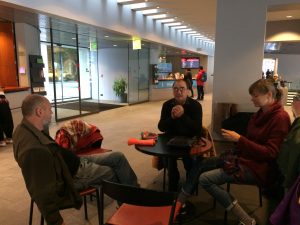
Our Saturday and Sunday we spent traveling around Iceland. This was only thanks to kindness of amazing team of Barka Iceland: Dorota Harembska, coordinator, Jurek Stuglik the leader and Magda Kowalska the assistant. Their warm welcome and a great companionship during our visit and our road trip made our stay very pleasant and full of interesting time. Thank you so much Dorota, Jurek and Magda.
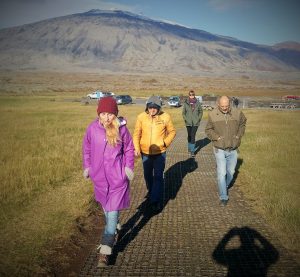
Aleksandra Kubiak
Barka Ireland




